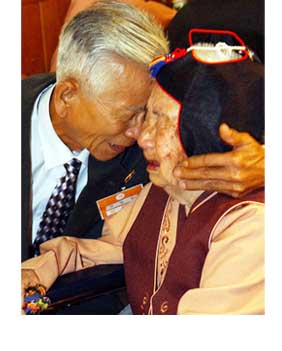What we do
Inter Korean

As one of the two National Societies operating in the Korean peninsula, we have mandated programs solely dedicated to resolving humanitarian challenges that span the 38th Parallel. One of them is restoring family links between the families who inadvertently became separated during and after the Korean War (in detail below). A key part of this is organizing inter-Korean family reunions, in partnership with the Red Cross DPRK, that allows such individuals to meet their loved ones face-to-face, most of them probably for their last time. At other times, we provide psychosocial support to the separated families and financial aid to low-income separated families. Mostly funded by our government, we also send relief items to North Korea in times of both emergencies and non-emergencies (in detail below). North Korea is most severely vulnerable due to its chronic poverty and disasters, and South Korea is its largest humanitarian aid donor.
If you have any question about our overall inter-Korean service, please contact us at pinter@redcross.or.kr
Restoring Family Links (RFL)
Since 2000, we have been organizing an inter-Korean family reunion at the family reunion center in Mt. Geumgamg (DPRK) that allowed close to 18,000 individuals, or a total of 4,000 families, to embrace their parents, siblings, spouses, children and relatives whom they haven’t seen since 1953. While physical reunion that offers direct contact with the separated families is obviously the most effective form of RFL, it is also most heavily influenced by external factors (e.g. politics) for this very reason. In other words, it is a big humanitarian challenge to have these family reunions more frequently; meanwhile, over 75,000 individuals residing in South Korea are aging and dying without meeting their families residing in North Korea. We therefore also offer alternative forms of RFL to compensate for this harsh reality, and they include letter exchange, live video meetings, family reunions in third countries and simply clarifying the fate of the family members residing in North Korea.
Humanitarian assistance
As a disaster risk reduction activity, we have been sending fertilizer and other non-food relief items to the Red Cross society in North Korea. Since 1995, we have donated a total of 1.09 trillion Korean won worth of humanitarian assistance to North Korea.
